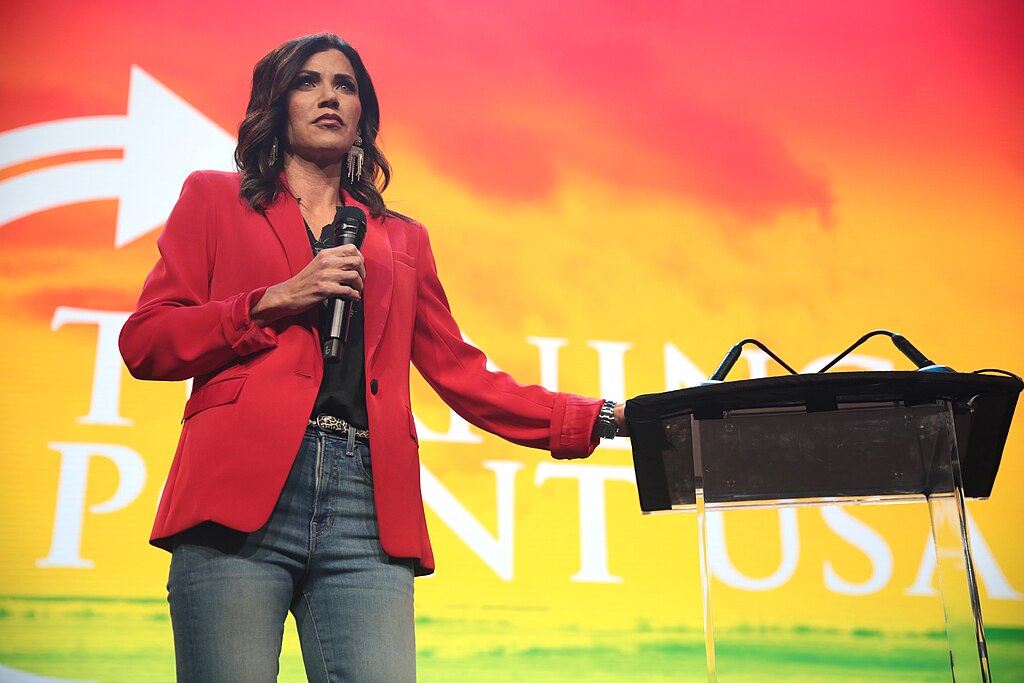
- Details
- By Levi Rickert
Republican South Dakota Governor Kristi Noem, who has been banished from four Indian reservations in her home state, made national news this past weekend when it was disclosed Noem killed a dog she deemed as untrainable for hunting.
The incident received condemnation from Republicans and Democrats alike, as well as animal rights groups.
A contender to be GOP presumptive nominee Donald Trump’s running mate in the upcoming November election, Noem wrote about the incident in her forthcoming memoir, No Going Back: The Truth on What's Wrong with Politics and How We Move America Forward.
The story was first published by The Guardian, which said it obtained a copy of the book that is due out next month. In the book, Noem describes killing “Cricket,” a 14-month wirehaired pointer that Noem writes had an aggressive personality.
Noem deemed Cricket as untrainable to be a hunting dog because she went "out of her mind with excitement” during a pheasant hunting trip. Upon return from the trip, Noem says Cricket killed another family’s chickens. When Noem attempted to stop Cricket Noem was bitten by the dog.
"I hated that dog," Noem writes in the book. The dog was "dangerous to anyone she came in contact with" and "less than worthless" as a hunting dog. "I realized I had to put her down," she continues.
The Guardian does not elaborate on when she actually killed the puppy. The story notes Noem included the incident in her book to demonstrate she has what it takes in politics to do what has to be done, even if it’s “difficult, messy, and ugly.”
As governor of South Dakota, home to nine federally recognized sovereign tribal nations and about 71,000 Native Americans who represent around 8 percent of the state’s population, Noem has maintained a contentious relationship.
In January, Noem was criticized by tribal leaders and tribally enrolled South Dakota lawmakers for comments she made about drugs on South Dakota reservations during a speech to lawmakers about the U.S.-Mexico border. In her speech, Noem implied Mexican drug cartels were being harbored on reservations.
Last month, while speaking at a town meeting in Mitchell, Noem told South Dakotans she wanted to help Native American students, but also took a swipe at Native parents and tribal councils.
“Their kids don’t have any hope,” Noem said. “They don’t have parents who show up and help them. They have a tribal council or a president who focuses on a political agenda more than they care about actually helping somebody’s life look better.”
Tribes throughout the state called Noem’s remarks out for what they were: racism.
More Stories Like This
Native News Weekly (August 25, 2024): D.C. BriefsUS Presidents in Their Own Words Concerning American Indians
Indigenous Actor Elaine Miles Reports Detention by Alleged ICE Agents
Happy Thanksgiving from Native News Online
Coming Up on Native Bidaské: Behind the Animation: Joey Clift Talks “Pow” and Native Storytelling
Help us tell the stories that could save Native languages and food traditions
At a critical moment for Indian Country, Native News Online is embarking on our most ambitious reporting project yet: "Cultivating Culture," a three-year investigation into two forces shaping Native community survival—food sovereignty and language revitalization.
The devastating impact of COVID-19 accelerated the loss of Native elders and with them, irreplaceable cultural knowledge. Yet across tribal communities, innovative leaders are fighting back, reclaiming traditional food systems and breathing new life into Native languages. These aren't just cultural preservation efforts—they're powerful pathways to community health, healing, and resilience.
Our dedicated reporting team will spend three years documenting these stories through on-the-ground reporting in 18 tribal communities, producing over 200 in-depth stories, 18 podcast episodes, and multimedia content that amplifies Indigenous voices. We'll show policymakers, funders, and allies how cultural restoration directly impacts physical and mental wellness while celebrating successful models of sovereignty and self-determination.
This isn't corporate media parachuting into Indian Country for a quick story. This is sustained, relationship-based journalism by Native reporters who understand these communities. It's "Warrior Journalism"—fearless reporting that serves the 5.5 million readers who depend on us for news that mainstream media often ignores.
We need your help right now. While we've secured partial funding, we're still $450,000 short of our three-year budget. Our immediate goal is $25,000 this month to keep this critical work moving forward—funding reporter salaries, travel to remote communities, photography, and the deep reporting these stories deserve.
Every dollar directly supports Indigenous journalists telling Indigenous stories. Whether it's $5 or $50, your contribution ensures these vital narratives of resilience, innovation, and hope don't disappear into silence.
 The stakes couldn't be higher. Native languages are being lost at an alarming rate. Food insecurity plagues many tribal communities. But solutions are emerging, and these stories need to be told.
The stakes couldn't be higher. Native languages are being lost at an alarming rate. Food insecurity plagues many tribal communities. But solutions are emerging, and these stories need to be told.
Support independent Native journalism. Fund the stories that matter.
Levi Rickert (Potawatomi), Editor & Publisher

